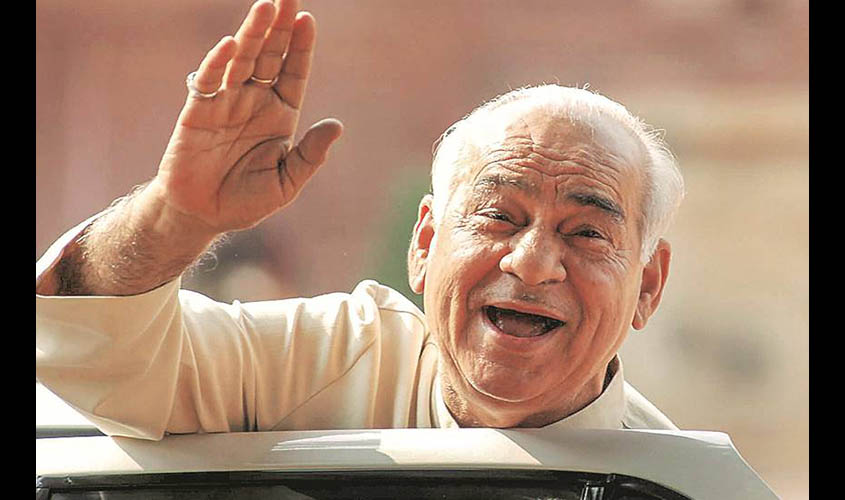Madan Lal Khurana was perhaps the last leader from the national capital with a mass appeal running across party lines. In fact his popularity was clearly evident at both his funeral last week and the prayer meeting that followed in his home constituency of Kirti Nagar. There were leaders from all major parties who attended his last rites and paid either a floral homage or a silent tribute to a man, who in his own words was the priest in an imposing temple, which in his mind symbolised Delhi.
Having covered the city from extremely close quarters during a sizable part of my journalistic career, Khurana would always be remembered for his deep commitment to the people of the metropolis and can readily be regarded as the finest Chief Minister Delhi ever had. His tenure was rather short—a little over two years—but his contribution was immense. The Delhi Metro, the flyover projects, particularly at the AIIMS crossing, and Dhaula Kuan intersection and scores of other measures were initiated by him. He would have achieved much more had his party stood by him and brought him back as Chief Minister.
After Chaudhary Brahm Prakash, Delhi’s first Chief Minister, and H.K.L. Bhagat, the uncrowned king of the capital, Khurana was a phenomenal leader. He won ten out of the eleven elections he contested, and the only one he lost was to Jagdish Tytler from Delhi Sadar in 1984, in the aftermath of Indira Gandhi’s assassination. As a young reporter with the Times of India I have a very vivid recollection of the counting of votes that was in progress at the Ludlow Castle government school. The process had just commenced, and I witnessed Khurana emerging out of the counting centre, with quiet dignity conceding defeat. Perplexed as to why he was doing so, when he was ahead by 1,500 votes from his Kirti Nagar segment, he knowingly smiled stating, without batting an eyelid, that if he was winning by merely 1,500 votes instead of 15,000 votes from his home turf, how he could expect to win from the remaining four metropolitan constituencies. Such was his grasp over grassroots politics.
There are several indelible memories that remain with me of him as Delhi’s premier leader. In February 1996, he had relinquished office as the Chief Minister to express solidarity with L.K. Advani, whose name figured prominently in the Jain hawala diaries, and who also resigned from his positions in the BJP. The then Rashtriya Swayamsevak Sangh stalwart, Rajinder Singh alias Rajju Bhaiya, had explicitly told Khurana not to vacate but he was determined to do so since he had the highest respect for both Advani and Atal Bihari Vajpayee. His first betrayal was on 9 October 1998, when after promising to bring him back as the Chief Minister, the two leaders went back on their word and installed Sushma Swaraj in the coveted position. Needless to say, the breach of faith left him devastated.
Khurana was the architect of the BJP in Delhi, in the same manner as Advani built the party all over India. There was not a single day when he would not hold a press conference at his favourite restaurant, Volga in Connaught Place, to levy charges of incompetence, corruption or wrongdoing against the ruling Congress. This did not purport that he had a personal grouse against any Congress leader, but it was a political battle that had to be fought on the turf provided to him.
Bhagat and Khurana were rivals in the field, but one of my most memorable recollections pertains to the both of them: Bhagat was on his death bed in the Apollo hospital, and when I met Khurana at the Meridien Hotel at Windsor Place, I happened to mention it to him. Aware that I had very close relations with Bhagat as well, he expressed his desire to visit him. I called up Bhagat’s son, Deepak, a schoolmate of Arun Jaitley and asked him when the right time to visit him would be.
Khurana and I went to the hospital, and after meeting Bhagat’s wife, we were led into his room. Bhagat, who was also suffering from memory lapses, immediately recognised both of us. He greeted Khurana by whispering his name and in a gesture of blessing placed his hand over his head. He also acknowledged my presence by beatifically smiling at me. By this time, Khurana had tears streaming down his cheeks.
Khurana also shared an extraordinary good chemistry with Ramvir Singh Bidhuri, a perceptive leader from the city, whose role has never been highlighted as much as it should have been, given his contribution in ending Bhagat’s supremacy over the capital. In 2003, when Bidhuri was contesting on the clock symbol from Badarpur, Khurana asked him to come to his house in Kirti Nagar. Khurana was the BJP CM nominee and when a reluctant Bidhuri finally met him, he handed over some money to him that he had received from a donor. He told Bidhuri that this was a contribution towards his election. Bidhuri was speechless. He understood that this was Khurana’s way of extending a helping hand in his hour of need.
In his passing away, the city has lost one of its favourite sons. For the last six years, he had been in a coma and recently lost his eldest son, Vimal, oblivious of his tragic death. Khurana will always remain synonymous with Delhi. Between us.

